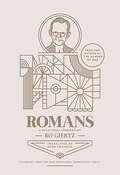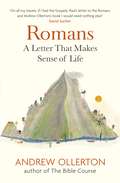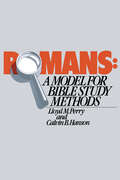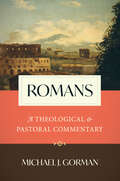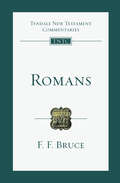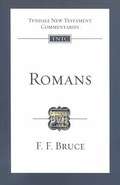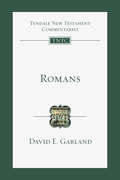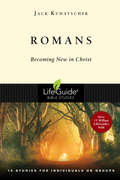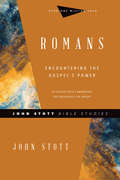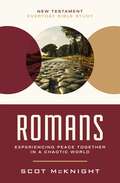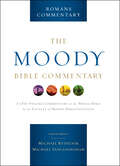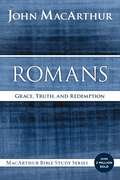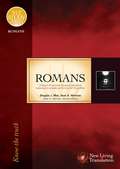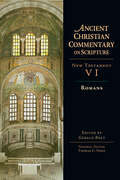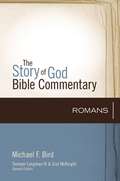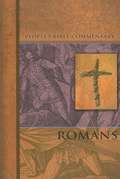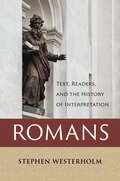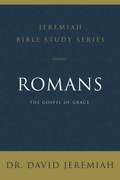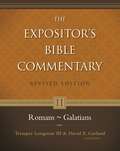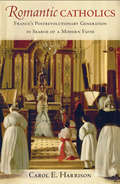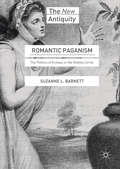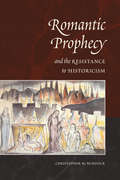- Table View
- List View
Romans: A Devotional Commentary
by Bror Erickson Bo GiertzFans of The Hammer of God and With My Own Eyes will enjoy this devotional commentary on Romans from Pastor, Bo Giertz. The beloved 20th-century bishop takes readers through Paul's letter to the Romans; pointing to God's grace in Christ and forgiveness for the sinner at every turn.Known as the "C.S. Lewis of Sweden," Bo Giertz, unerringly reveals the fountain of good news in every Romans passage. Giertz delivers part commentary by thoroughly dissecting each passage, and part devotional as he keenly directs readers to comforts won for them by Christ crucified in all His saving glory.
Romans: A Letter That Makes Sense of Life
by Andrew Ollerton'On all my travels, if I had the Gospels, Paul's letter to the Romans and Andrew Ollerton's book I would need nothing else!'Sir David SuchetWith his trademark straightforward teaching style, Andrew Ollerton guides readers through Romans - one of the most theologically complex books of the Bible - to discover how an understanding of Paul's longest letter unlocks the whole story of Scripture and helps us make sense of life.It's been said that if the New Testament were the Himalayas, Paul's Epistle to the Romans would be Mount Everest. The chapters of this book therefore imagine the contents of the letter as a great mountain landscape - complex, challenging but highly rewarding. Together, we will take on the challenge of ascending to the summit, taking in the view and then descending to put it into practice on the other side.Readers will not only come away with a greater understanding of Romans, but as invigorated disciples, equipped for the adventure of life and faith, and emboldened to share the Gospel with others.Each chapter includes suggested Bible readings and questions for reflection, making this book a great choice for devotional reading for Lent 2023. Romans is a perfect follow-up read for fans of Andrew's first book The Bible, those who've completed Bible Society's 'The Bible Course', or the Alpha course.
Romans: A Letter That Makes Sense of Life
by Andrew Ollerton'On all my travels, if I had the Gospels, Paul's letter to the Romans and Andrew Ollerton's book I would need nothing else!'Sir David SuchetWith his trademark straightforward teaching style, Andrew Ollerton guides readers through Romans - one of the most theologically complex books of the Bible - to discover how an understanding of Paul's longest letter unlocks the whole story of Scripture and helps us make sense of life.It's been said that if the New Testament were the Himalayas, Paul's Epistle to the Romans would be Mount Everest. The chapters of this book therefore imagine the contents of the letter as a great mountain landscape - complex, challenging but highly rewarding. Together, we will take on the challenge of ascending to the summit, taking in the view and then descending to put it into practice on the other side.Readers will not only come away with a greater understanding of Romans, but as invigorated disciples, equipped for the adventure of life and faith, and emboldened to share the Gospel with others.Each chapter includes suggested Bible readings and questions for reflection, making this book a great choice for devotional reading.Romans is a perfect follow-up read for fans of Andrew's first book The Bible, those who've completed Bible Society's 'The Bible Course', or the Alpha course.
Romans: A Model for Bible Study Methods
by Lloyd Perry Calvin HansonRomans: A Model for Bible Study Methods is a unique resource. It is both a commentary and study guide, full of suggestions and guidelines for individual or group study. It includes general study methods for Romans, approaches for outlining the letter, special study projects, and even a comprehensive final exam. This resource is recommended for both pastors and lay leaders—anyone who wants a thorough grasp of the book of Romans.
Romans: A Model for Bible Study Methods
by Lloyd Perry Calvin HansonRomans: A Model for Bible Study Methods is a unique resource. It is both a commentary and study guide, full of suggestions and guidelines for individual or group study. It includes general study methods for Romans, approaches for outlining the letter, special study projects, and even a comprehensive final exam. This resource is recommended for both pastors and lay leaders—anyone who wants a thorough grasp of the book of Romans.
Romans: A Theological and Pastoral Commentary
by Michael J. Gorman&“Above all, Romans is a letter about Spirit-enabled participation and transformation in Christ and his story, and thus in the mission of God in the world.&” This commentary engages the letter to the Romans as Christian scripture and highlights the Pauline themes for which Michael Gorman is best known—participation and transformation, cruciformity and new life, peace and justice, community and mission. With extensive introductions both to the apostle Paul and to the letter itself, Gorman provides the needed background on Paul&’s first-century context before proceeding into the rich theological landscape of the biblical text. In line with Paul&’s focus on Christian living, Gorman interprets Romans at a consistently practical level, highlighting the letter&’s significance for Christian theology, for daily life, and for pastoral ministry. Questions for reflection and sidebars on important concepts make this especially useful for those preparing to preach or teach from Romans—the &“epistle of life,&” as Gorman calls it, for its extraordinary promise that, through faith, we &“might walk in newness of life&” with Christ.
Romans: An Introduction And Commentary (Tyndale New Testament Commentaries #Volume 6)
by F. F. BrucePaul's epistle to the Romans changed the lives of many great Christian thinkers, including Augustine, Martin Luther, John Wesley and Karl Barth. However, while Romans has been among the most influential books of the New Testament, it has also been the subject of some of the church's most heated debates. What is justification by faith? What is the relationship between law and grace? What is God's ultimate purpose for Israel? Without losing sight of the simplicity of the gospel, F. F. Bruce guides us along the difficult but rewarding paths of this great letter. The original, unrevised text of this volume has been completely retypeset and printed in a larger, more attractive format with the new cover design for the series. The Tyndale New Testament Commentaries have long been a trusted resource for Bible study. Written by some of the world's most distinguished evangelical scholars, these twenty volumes offer clear, reliable and relevant explanations of every book in the New Testament. These Tyndale volumes are designed to help readers understand what the Bible actually says and what it means. The introduction to each volume gives a concise but thorough description of the authorship, date and historical background of the biblical book under consideration. The commentary itself examines the text section by section, drawing out its main themes. It also comments on individual verses and deals with problems of interpretation. The aim throughout is to get at the true meaning of the Bible and to make its message plain to readers today.
Romans: An Introduction And Commentary (Tyndale New Testament Commentaries Volume #6)
by F. F. BrucePaul's epistle to the Romans changed the lives of many great Christian thinkers, including Augustine, Martin Luther, John Wesley and Karl Barth. However, while Romans has been among the most influential books of the New Testament, it has also been the subject of some of the church's most heated debates. What is justification by faith? What is the relationship between law and grace? What is God's ultimate purpose for Israel? Without losing sight of the simplicity of the gospel, F. F. Bruce guides us along the difficult but rewarding paths of this great letter.
Romans: An Introduction and Commentary (Tyndale New Testament Commentaries #Volume 6)
by David E. GarlandRomans has been described as the theological epistle par excellence. The apostle Paul emphasizes that salvation is by God's grace alone and that freedom, hope, and the gift of righteousness are secured through Christ's death and resurrection, with the promise of a new and glorious destiny. Through the power of the Holy Spirit, believers can discern and do the will of God. God's purpose is to bring Jews and Gentiles together so that they may glorify him with one voice. In this Tyndale Commentary, David Garland offers clear guidance along the rewarding, though sometimes difficult, paths of this great letter. The Tyndale Commentaries are designed to help the reader of the Bible understand what the text says and what it means. The Introduction to each book gives a concise but thorough treatment of its authorship, date, original setting, and purpose. Following a structural Analysis, the Commentary takes the book section by section, drawing out its main themes, and also comments on individual verses and problems of interpretation. Additional Notes provide fuller discussion of particular difficulties. In the new New Testament volumes, the commentary on each section of the text is structured under three headings: Context, Comment, and Theology. The goal is to explain the true meaning of the Bible and make its message plain.
Romans: Becoming New in Christ (LifeGuide Bible Studies)
by Jack KuhatschekSometimes our worship loses its passion. Our prayer life becomes stagnant. We forget why we are serving God. And slowly, subtly, the world's ways become our ways. In this nineteen-session LifeGuide Bible Study on the book of Romans addresses these problems, showing us how we can break out of old patterns and become new in Christ. For over three decades LifeGuide Bible Studies have provided solid biblical content and raised thought-provoking questions—making for a one-of-a-kind Bible study experience for individuals and groups. This series has more than 130 titles on Old and New Testament books, character studies, and topical studies.
Romans: Encountering the Gospel's Power (John Stott Bible Studies)
by John StottStudy Scripture with John Stott
Romans: Experiencing Peace Together in a Chaotic World (New Testament Everyday Bible Study Series)
by Scot McKnightRedemptive Peace The church in Rome was split into differing groups and in their zeal to advocate for their viewpoints had gone over the line of gospel mission to controlling ambition.In trying to unify a congregation he&’d never met, the Apostle Paul starts the first half of his letter reminding the believers of their redemption in Jesus, anticipating the unity for their life together. Paul ends with a call for peace; a redemptive peace that speaks to how to live in relation to our state, our work, our church, and our households.Romans is the most influential document in the New Testament for the formation of what Christians believe today. But it also has importance for how to live that belief in our chaotic world.Ideal for personal reflection or group study, Scot McKnight explores the links between the Bible&’s world and ours, presenting the enduring relevance of the letter to the Romans for us today.In the New Testament Everyday Bible Study Series, widely respected biblical scholar Scot McKnight combines interpretive insights with pastoral wisdom for all the books of the New Testament. Each volume provides:Original Meaning. Brief, precise expositions of the biblical text and offers a clear focus for the central message of each passage.Fresh Interpretation. Brings the passage alive with fresh images and what it means to follow King Jesus.Practical Application. Biblical connections and questions for reflection and application for each passage.
Romans: From The Moody Bible Commentary
by Michael VanlaninghamThe Romans Commentary is written by Dr. Michael Vanlaningham, the co-editor of The Moody Bible Commentary. This commentary on Romans opens with a description of its author, date, purpose, and themes. As well, an outline is provided depicting the overall structure of Romans. Drawing from his New Testament scholarship and deep understanding of the biblical language, the author provides insight into the verses and sections of Paul&’s epistle. The scripture being commented on is shown in bold print for easy reference and a short bibliography at the end of the book allows for further study. This clear and reliable commentary on Romans is excellent for anyone who wants to explore and better understand this portion of scripture. It provides a concise explanation of the text for Sunday school teachers, Bible study leaders, missionaries, and pastors. The Romans Commentary will help you better understand and apply God&’s word!
Romans: From The Moody Bible Commentary
by Michael VanlaninghamThe Romans Commentary is written by Dr. Michael Vanlaningham, the co-editor of The Moody Bible Commentary. This commentary on Romans opens with a description of its author, date, purpose, and themes. As well, an outline is provided depicting the overall structure of Romans. Drawing from his New Testament scholarship and deep understanding of the biblical language, the author provides insight into the verses and sections of Paul&’s epistle. The scripture being commented on is shown in bold print for easy reference and a short bibliography at the end of the book allows for further study. This clear and reliable commentary on Romans is excellent for anyone who wants to explore and better understand this portion of scripture. It provides a concise explanation of the text for Sunday school teachers, Bible study leaders, missionaries, and pastors. The Romans Commentary will help you better understand and apply God&’s word!
Romans: Grace, Truth, and Redemption (MacArthur Bible Studies)
by John F. MacArthurPaul's letter to the Romans is an inspired masterpiece of doctrine highlighting God's grace, truth, and redemption. Pastor John MacArthur will take you through the book, passage by passage, so that you can better understand everything from the cultural context to Paul's theological points.Within the pages of Romans, the apostle Paul powerfully shares his message of good news and eternal salvation with the church, advises believers on theological truths, gives practical applications for living the Christian life, and shows how God&’s righteousness comes by grace alone through faith in Christ.The book of Romans underscores that Christianity is far more than just a doctrine—it is an essential road map for daily living.—ABOUT THE SERIES—The MacArthur Bible Study series is designed to help you study the Word of God with guidance from widely respected pastor and author John MacArthur. Each guide provides intriguing examinations of the whole of Scripture by examining its parts and incorporates:Extensive, but straight-forward commentary on the text.Detailed observations on overriding themes, timelines, history, and context.Word and phrase studies to help you unlock the broader meaning and apply it to your life.Probing, interactive questions with plenty of space to write down your response and thoughts.
Romans: Know the Truth (NLT Study Series)
by Douglas J. Moo Sean A. HarrisonThe NLT Study Series is based on the NLT Study Bible. Each of the 13-week studies provide an in-depth study of a particular Bible book. The entire text of that book from the NLT Study Bible is included. The NLT Study Series explores the textual, linguistic, literary, and cultural aspects of the scriptures and those to whom it was written.
Romans: New Testament (Ancient Christian Commentary on Scripture #6)
by Gerald BrayChristianity Today
Romans: Paul Among Jews, Greeks, And Romans (The Story of God Bible Commentary)
by Michael F. BirdA new commentary for today’s world, The Story of God Bible Commentary explains and illuminates each passage of Scripture in light of the Bible’s grand story. The first commentary series to do so, SGBC offers a clear and compelling exposition of biblical texts, guiding readers in how to creatively and faithfully live out the Bible in their own contexts. Its story-centric approach is idea for pastors, students, Sunday school teachers, and all who want to understand the Bible in today’s world.SGBC is organized into three easy-to-use sections, designed to help readers live out God’s story: Listen to the Story; Explain the Story; and Live the Story.Praise for SGBC:“The easy-to-use format and practical guidance brings God’s grand story to modern-day life so anyone can understand how it applies today.”—Andy Stanley“Opens up the biblical story in ways that move us to act.”—Darrell L. Bock“It makes the text sing and helps us hear the story afresh.”—John Ortberg“This commentary breaks new ground.”—Craig L. Blomberg
Romans: Text, Readers, and the History of Interpretation
by Stephen WesterholmA wide-ranging study of the interpretation of Paul&’s letter to the Romans throughout history, from Origen to Karl Barth. In anticipation of his Illuminations commentary on Paul&’s letter to the Romans, Stephen Westerholm offers this extensive survey of the reception history of Romans. After two initial chapters discussing the letter&’s textual history and its first readers in Rome (a discussion carried out in dialogue with the Paul-within-Judaism stream of scholarship), Westerholm provides a thorough overview of over thirty of the most influential, noteworthy, and representative interpretations of Romans from nearly two thousand years of history. Interpreters surveyed include Origen, John Chrysostom, Augustine, Peter Abelard, Thomas Aquinas, Martin Luther, John Calvin, John Locke, Cotton Mather, John Wesley, and Karl Barth. Bearing in mind that Paul did not write for scholars, Westerholm includes in his study interpreters like Philipp Jakob Spener and Richard Baxter who addressed more popular audiences, as well as an appendix on a remarkable series of 372 sermons on Romans by beloved British preacher Martyn Lloyd-Jones. A further aim of the book is to illustrate the impact of this New Testament letter on Christian thought, supporting Westerholm&’s claim that &“the history of the interpretation of Romans is, in important areas and to a remarkable extent, the history of Christian theology.&”
Romans: The Gospel of Grace (Jeremiah Bible Study Series)
by Dr. David JeremiahThe apostle Paul makes his appearance in the Bible as an ambitious Pharisee who is determined to destroy the early church. But his religious world comes crashing down when he meets the risen Jesus on the road to Damascus. Paul is never the same, and soon he is traveling across the world to spread the gospel. At one point, Paul writes a letter to a church in Rome, outlining in clear terms the central truths and doctrines of the Christian faith. Romans reads like a first-century course in theology, culminating in the incredible truth that God has made a way—through the sacrifice of Christ—for all to find salvation.The Jeremiah Bible Study Series captures Dr. David Jeremiah&’s many years of commitment in teaching the Word of God. In each study, you will gain insights into the text, identify the key stories and themes, and be challenged to correctly apply the truths and meanings you find to your own life. Sections include:Getting Started: An opening question to introduce the lessonSetting the Stage: A short reflection to explain the context of the studyExploring the Text: The Scripture reading for the lesson with related study questionsReviewing the Story: Questions to help you identify key points in the Scripture readingApplying the Message: Questions to help you apply the key ideas to your lifeReflecting on the Meaning: A closing reflection on the key teachings in the lessonEach of the Bible studies in this series will help you understand what the Bible says—particularly in its original context—and how to apply its teachings to your life.
Romans–Galatians (The Expositor's Bible Commentary)
by Tremper Longman III David E. GarlandContinuing a Gold Medallion Award-winning legacy, this completely revised edition of The Expositor’s Bible Commentary series puts world-class biblical scholarship in your hands. Based on the original twelve-volume set that has become a staple in college and seminary libraries and pastors’ studies worldwide, this new thirteen-volume edition marshals the most current evangelical scholarship and resources. The thoroughly revised features consist of: • Comprehensive introductions • Short and precise bibliographies • Detailed outlines • Insightful expositions of passages and verses • Overviews of sections of Scripture to illuminate the big picture • Occasional reflections to give more detail on important issues • Notes on textual questions and special problems, placed close to the texts in question • Transliterations and translations of Hebrew and Greek words, enabling readers to understand even the more technical notes • A balanced and respectful approach toward marked differences of opinion
Romantic Catholics: France’s Postrevolutionary Generation in Search of a Modern Faith
by Carol E. HarrisonIn this well-written and imaginatively structured book, Carol E. Harrison brings to life a cohort of nineteenth-century French men and women who argued that a reformed Catholicism could reconcile the divisions in French culture and society that were the legacy of revolution and empire. They include, most prominently, Charles de Montalembert, Pauline Craven, Amélie and Frédéric Ozanam, Léopoldine Hugo, Maurice de Guérin, and Victorine Monniot. The men and women whose stories appear in Romantic Catholics were bound together by filial love, friendship, and in some cases marriage. Harrison draws on their diaries, letters, and published works to construct a portrait of a generation linked by a determination to live their faith in a modern world. Rejecting both the atomizing force of revolutionary liberalism and the increasing intransigence of the church hierarchy, the romantic Catholics advocated a middle way, in which a revitalized Catholic faith and liberty formed the basis for modern society. Harrison traces the history of nineteenth-century France and, in parallel, the life course of these individuals as they grow up, learn independence, and take on the responsibilities and disappointments of adulthood. Although the shared goals of the romantic Catholics were never realized in French politics and culture, Harrison's work offers a significant corrective to the traditional understanding of the opposition between religion and the secular republican tradition in France.
Romantic Paganism: The Politics of Ecstasy in the Shelley Circle (The New Antiquity)
by Suzanne L. BarnettThis book addresses the function of the classical world in the cultural imaginations of the second generation of romantic writers: Percy Shelley, Mary Shelley, Thomas Love Peacock, John Keats, Leigh Hunt, and the rest of their diverse circle. The younger romantics inherited impressions of the ancient world colored by the previous century, in which classical studies experienced a resurgence, the emerging field of comparative mythography investigated the relationship between Christianity and its predecessors, and scientific and archaeological discoveries began to shed unprecedented light on the ancient world. The Shelley circle embraced a specifically pagan ancient world of excess, joy, and ecstatic experiences that test the boundaries between self and other. Though dubbed the “Satanic School” by Robert Southey, this circle instead thought of itself as “Athenian” and frequently employed mythology and imagery from the classical world that was characterized not by philosophy and reason but by wildness, excess, and ecstatic experiences.
Romantic Prophecy and the Resistance to Historicism
by Christopher BundockRomantic writers invoked prophecy throughout their work. However, the failure of prophecy to materialize didn't deter them. Why then do Romantic writers repeatedly invoke prophecy when it never works? The answer to this question is at the heart of Romantic Prophecy and the Resistance to Historicism. In this remarkably erudite work, Christopher Bundock argues that the repeated failure of prophecy in Romantic thought is creative and enables a renewable potential for expression across disciplines. By focusing on new readings of canonical Romantic authors as well as their more obscure works, Bundock makes a bold intervention into major concepts such as Romantic imagination, historicity, and mediation. Romantic Prophecy and the Resistance to Historicism glides across Kant's Swedenborgian dreams to Mary Shelley's Last Man and reveals how Romanticism reinvents history by turning prophecy inside out.
